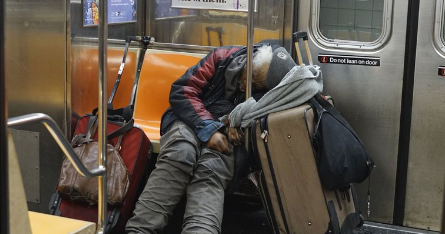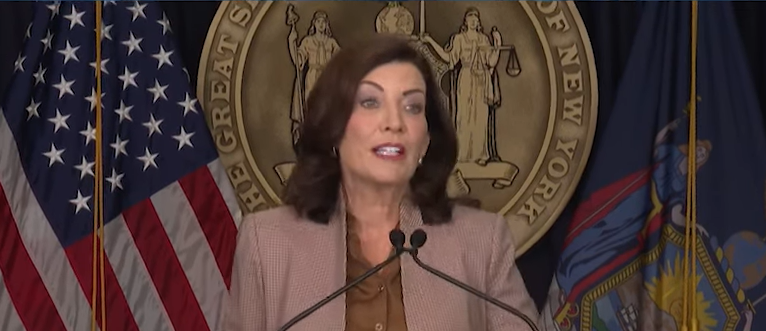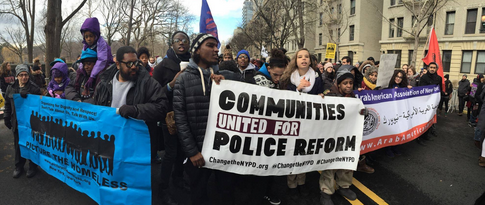Photos: YouTube\Twitter
The New York City Council will vote on legislation this week to require the City to pay higher rates in its rental assistance voucher program for homeless New Yorkers.
Int. 146-C also eliminates the program’s current five-year cap for vouchers. Moving forward, anyone who continues to qualify for the program will be eligible. These changes will increase the number of apartments available to homeless New Yorkers and help move more people out of shelter and into permanent housing. Last night, 48,245 people slept in a Department of Homeless Services shelter, according to the latest figures provided by the city on Tuesday.
The Council will vote on Int. 146-C on Thursday at its Stated Meeting. It has 40 sponsors, which is a super majority in the 51-member Council. Speaker Johnson announced the upcoming vote on Tuesday at a homeless shelter in East Harlem with Council Member Stephen Levin, the prime sponsor, Christine Quinn, President of Women In Need, a non-profit that provides services to homeless women and children, as well as other leading homeless advocates.
Currently, vouchers in the program, known as CityFHEPS, are capped at $1,265 a month for a single adult and $1,580 for a family of three or four. The legislation will require the CityFHEPS rates to align with Section 8, the country’s most successful rental assistance voucher. Section 8 allows $1,945 for a one-bedroom apartment or $2,217 for a two-bedroom apartment.
In addition, research by StreetEasy released in April 2021 found that record-high rent drops and high inventory levels from COVID-19 have more than doubled the number of homes on the market that are deemed affordable for Section 8 voucher participants. Using all apartments listed from July through December 2020, only 564 units would meet current CityFHEPS standards, whereas 71,934 would meet Section 8 standards.
Opening up the universe of apartments that are potentially voucher-eligible means more opportunities to permanently house individuals and families, and to reduce the risk and length of homelessness. A two-bedroom voucher at the increased rate would cost the city up to $21,200 a year while a shelter stay during this same time period is about $74,000 a year.
Currently, it takes a family an average of three months to find housing after receiving CityFHEPS, a reflection of how difficult it is to find housing with the voucher. This bill would aid in shortening that timeframe.
“Expecting a family of four to find an apartment for $1580 a month in New York City is just absurd. Yet that’s what we’ve done for years and then wondered why our homeless shelters were full. Everyone in this city deserves to live in a permanent, affordable home. This City Council bill will finally raise the value of city housing vouchers, a big step toward helping to end New York’s chronic homeless crisis. I’m proud of Council Member Levin, all my colleagues in the Council, WIN, all the advocates and people experiencing homelessness for pushing to make this increase happen. And it’s more important than ever: The eviction moratorium will expire this summer, leaving many families and individuals without homes. With rents coming down and the value of vouchers going up, I’m hopeful that they will quickly find replacements instead of overwhelming our shelter system,” said City Council Speaker Corey Johnson.
“I am elated that Int 146 will get a vote on Thursday. This bill will be transformative for thousands of New Yorkers experiencing homelessness and will allow many families to finally find permanent, stable housing. This is the result of years of hard work by advocates and impacted people who demanded a usable City FHEPs voucher. In my time at the council, my office has tried to help countless constituents who qualify for vouchers find acceptable housing. But there were too many applicants and too few available units and people waited for years with vouchers that were all but worthless. The change to raise voucher amounts is an investment in housing and the fight against homelessness, and an affirmation of the human right to housing,” said Council Member Stephen Levin, the prime sponsor of Int. 146-C.
“For years, New York City provided families in shelter with vouchers that couldn’t pay the rent. We offered them hope, but never delivered them solutions that could help – a cruel bait-and-switch that left families struggling. With the passage of Intro. 146, thousands of New York City’s homeless families will finally have vouchers that can actually help them find apartments and exit shelter. Finding a home of their own can be life-changing, and we thank Speaker Corey Johnson, Council Member Stephen Levin, and the City Council for their commitment to securing this increase for families in need. We’re proud that through the dedicated work of our staff, families and partners, families in shelter will be one step closer to breaking the cycle of homelessness,” said Christine Quinn, President and CEO of WIN, New York’s largest provider of shelter and supportive housing for homeless families.
“We applaud Speaker Corey Johnson for bringing Intro. 146 to a vote, and thank Council Member Stephen Levin and each member of the City Council that has supported Intro. 146. Domestic violence is the number one driver of family homeless in New York City, with nearly 19,000 survivors and their children entering shelter each year due to abuse. Raising the value of CityFHEPS voucher to fair market rates will offer families a pathway out of homelessness, helping to break the cycle of homelessness caused by domestic violence. We urge the City Council to pass, and Mayor de Blasio to sign, Intro. 146, which will truly make CityFHEPS a life-saving tool that enables individuals and families to exit homelessness into permanent, stable housing,” said Nicole Branca, Executive Director at New Destiny Housing.
“Homeless Services United would like to thank Council Member Levin and Speaker Johnson for their leadership in championing this bill and bringing it to a vote. Homeless New Yorkers have long struggled to secure housing with inadequate voucher programs that caused people to languish in shelter with little hope of securing housing. Bringing vouchers up to market level will be transformative for countless New Yorkers who will finally have a meaningful pathway to permanency. We eagerly await the passage of this important bill,” said Catherine Trapani, Executive Director, Homeless Services United.
“Making the private housing market accessible to all is a critical element to addressing homelessness and creating housing equity in our City. Passing Intro. 146 to raise the maximum rental amounts of CityFHEPS vouchers to fair market rates will make City-funded housing subsidies a much more effective tool for homeless New Yorkers to move out of shelters and off the streets into stable, independent housing. We look forward to seeing this bill come to a vote on Thursday, and we applaud Council Member Stephen Levin and Council Speaker Corey Johnson for their diligent work to move our City one step closer to ending homelessness,” said Frederick Shack, Chief Executive Officer of Urban Pathways.
“Thank you to Speaker Johnson, Councilmember Levin, and the many homeless and formerly homeless advocates for their relentless support of Intro. 146. For too long, New Yorkers have struggled to find permanent housing with CityFHEPS vouchers due to unrealistically low rent limits. As the pandemic has exacerbated the city’s existing housing crisis and pushed countless more New Yorkers to the brink of homelessness, the time is now to improve CityFHEPS and allow more people to exit or avoid shelters by passing Intro. 146,” said Dave Giffen, Executive Director of Coalition for the Homeless.
“We commend Speaker Corey Johnson, Councilmember Levin, fellow advocates and all who helped bring Intro 146 to a vote. Families with children across New York City are just starting to dig themselves out of a year of loss, economic hardship and impossible choices. Thousands owe back rent they will never be able to pay. Many families experiencing housing instability are led by women of color in communities hit hardest by the pandemic. To prevent shelter entry and to enable those in shelter to quickly exit to permanent housing, passing Intro 146 would ensure, for the first time, that the City’s largest rental subsidy program offers market rate vouchers that reflect the true cost of rent in New York City. Given the plight of families and with federal relief on its way, there has never been a better moment to make this investment. City leaders should ensure 146 becomes law as soon as possible,” said Jennifer March, Executive Director of Citizens’ Committee for Children and co-lead of the Family Homelessness Coalition.
“Our clients and many individuals experiencing homelessness are all too often left languishing in shelters because of inadequate and unrealistic housing voucher amounts. Increasing these amounts to market rates will be a critical step towards ensuring housing equity and stability for countless families across New York City. We commend Council Member Stephen Levin and Council Speaker Corey Johnson for their leadership,” said Judith Goldiner, Attorney-in-Charge of the Civil Law Reform Unit at The Legal Aid Society.
“The last year has shown us the devastating impact that housing instability has had on the health of our communities. As we continue to rebuild, it is imperative that New York City adopt a trauma-informed approach to housing for vulnerable people. Safe, decent, affordable housing should be available to all and not a privilege for the few. We applaud Speaker Johnson, Council Member Levin, our allies in the City Council and directly impacted individuals for your leadership in championing Intro 146 and bringing it to a vote. Raising CityFHEPS vouchers to fair market rates will create a viable path into stable housing for many New Yorkers experiencing homelessness. We urge the City Council to vote yes on Intro 146!” said George Nashak, President and CEO, Care For the Homeless.
“This is a victory for many of us who have been marginalized due to our housing situation. This is a victory for all those who were and still are homeless to know that if we come together to raise our voices it can yield a positive result. Housing is a human right,” said Fannie Lou Diane, member leader of Neighbors Together.







